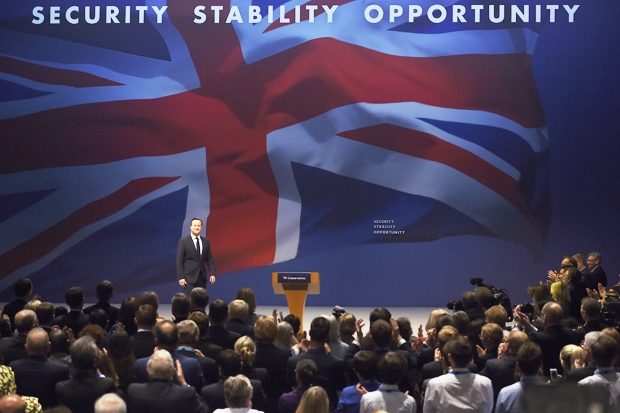Political party conferences have, in recent years, felt like an empty ritual. They used to be convened in seaside towns, so grassroots activists could find affordable accommodation. Now they are usually held in cities, so lobbyists can find better restaurants. Activists have been supplanted by members of the political class who are charged £500 a ticket. In the fringe debates, speakers face a volley of questions from people paid to ask them — on pensions, subsidies for green energy and the like. Politicians spend all day talking to journalists, and real politics vanishes.
This year, however, politics has returned. The protesters who shrieked and spat at anyone entering the Tory party conference in Manchester helped remind delegates how things have changed: we’re back to a battle of two competing visions of society. Labour has been captured by a resurgent hard left. When Jeremy Corbyn travelled up to join the protesters, he confirmed the very impression that David Cameron sought to convey. The party of government was inside the conference hall. The party of protest was outside.
Remarkably, the Tory party conference is being attended by Tories again. Some 5,500 activists attended this year, the highest figure in the party’s history and double that of ten years ago. This is not because David Cameron inspired a surge in party membership (he has done quite the reverse), but because so many now believe that the Tories are more likely to be in power for ten years than for five — so it’s worthwhile meeting other Conservatives and comparing notes. The sheer size of the queues in Manchester this week were a sign of a party rejuvenated.
The scenes in Brighton the week before, by contrast, were of a party in its death throes. The Labour party conference held no serious discussion about why the party lost. Instead, they tut-tutted at voters: in one fringe discussion, the Daily Mail was blamed for the fact that 60 per cent of the public support welfare reform (the newspaper is bought by 3 per cent of adults). The general theme of Labour’s conference was that the party lost the election because of false consciousness on behalf of the people. The conclusion of Labour’s conference was simple: no compromise with the voters.
As leader of the opposition, Jeremy Corbyn should never have attended a protest outside the Tory party conference. Yet this is, to him, the ‘new politics’. He is at his most comfortable when addressing crowds of sympathisers. He sees a Britain of division and conflict: landlord vs tenant, employer vs worker, rich vs poor. This is not politics, but fantasy — yet in the digital age, it’s far easier for those who believe in this fantasy to find each other on social media, pay £3 to vote for a leader and now — amazingly — capture a political party. Hence the Corbyn phenomenon.
The Tory fringe events were devoted to practical subjects: how to better appeal to northern voters, how to promote housing supply, how to help the blue-collar workers whom the Labour party is abandoning. These discussions indicated that Tory members have a better idea than the Tory leadership of the size of the opportunity (and dangers) in front of them.
For example, how will Zac Goldsmith hold on to London, which is, in effect, a Labour city? He is the son of a billionaire who will be standing against the son of an immigrant bus driver — Labour’s Sadiq Khan — in a city which is now one third immigrant. Goldsmith is not endowed with Boris Johnson’s energy or eloquence; he is by no means an extrovert, and his shyness could be mistaken for arrogance. His problem is that voters may suspect that Conservatives don’t like immigrants. So Theresa May’s bizarre speech, claiming that immigration harms Britain’s social fabric, plays straight into Labour’s hands.
The Home Secretary is right to say that Britain should not accept immigrants at a faster rate than it is able to integrate them. But as with welfare reform, Tories need to take great care in the language they use — to say (as she did) that it is ‘impossible’ to build a ‘cohesive’ society in the face of such immigration is unwise and untrue. At present, the Tories have a rare opportunity to appeal to the Labour voters who are dismayed at the Corbyn takeover. Now is the time to show why modern Conservatism is the surest way of bringing about a stronger, fairer society.
It was Boris Johnson who made this point best, in what was easily the most impressive speech of the Tory conference. If crime hits the poorest hardest, then it is the poor who have most to gain from falls in crime. If failing schools hurt the poorest most, then the poor gain most from school reform. It is the Conservative agenda that speaks most powerfully to these issues.
As Labour sinks deeper into crisis and absurdity, a great many voters will be looking for a new home. There is a compelling case for progressive Conservatism, but it was not really made by the party leadership this week. This is not just something that should be crammed into the closing passages of a leader’s speech. It is a philosophy that should define everything this government does. The conference season has highlighted Cameron’s opportunity. If he wants to seize it, he has much more work to do.






Comments